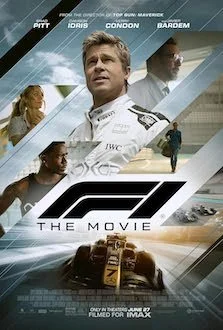Direction: Joseph Kosinski
Country: USA
Directed by Joseph Kosinski (Oblivion, 2013; Top Gun: Maverick, 2022) from a screenplay by Ehren Kruger, and co-produced by Jerry Bruckheimer, British F1 pilot Lewis Hamilton, and Brad Pitt—who stars as fictional pilot Sonny Hayes—F1: The Movie blends thrilling races, bland romance, overdramatic celebrations, and crooked deals.
There’s nothing particularly new or noteworthy in this ultra-formulaic car action flick that goes nowhere fast. We follow fearless yet reckless veteran driver Sonny Hayes (Pitt), a gambling addict, as he joins a nearly bankrupt team at the invitation of owner and former teammate Ruben Cervantes (Javier Bardem). Sonny quickly challenges everyone—“Who’s fighting? I’m racing!”—including his new teammate, the prodigiously talented rookie Joshua Pearce (Damson Idris), who becomes his chief rival.
While some racing scenes do deliver the adrenaline, the narrative rarely hits top gear, as the script struggles to make its dramatic beats land. This monstrous commercial blockbuster has a vigorous start, ultimately running out of gas and disintegrating into uneven pieces. The soundtrack by Hans Zimmer—a combination of classical and electronic elements—didn’t convince, contributing to the film’s general stodginess.








